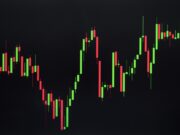Market volatility often creates disconnects between stock prices and business fundamentals. While many investors instinctively avoid falling stocks, these temporary declines can create exceptional entry points for quality businesses with solid long-term prospects.
Our analysis identifies three market leaders currently trading near 52-week lows with compelling valuation metrics. Each faces short-term challenges that have pressured share prices, creating potential opportunities for investors willing to look beyond immediate headwinds.
Merck (MRK): Pharmaceutical Value With Pipeline Potential
Merck has experienced a punishing 22% decline year-to-date, recently touching fresh 52-week lows. This significant pullback reflects several near-term concerns, including recent quarterly results showing a 2% revenue decline and uncertainty surrounding tariff impacts on its global business.
The pharmaceutical giant specifically cited anticipated costs of approximately $200 million related to tariffs this year, with particular exposure to China – a key market for the company. However, recent diplomatic developments suggest potential relief, with both the U.S. and China agreeing to significantly reduce tariff rates for a 90-day period.
Beyond these short-term pressures, Merck’s valuation has compressed to remarkably attractive levels. The stock currently trades at just 11.7 times trailing earnings – a substantial discount to both the broader market and its historical average. This compressed multiple provides significant downside protection while investors wait for catalysts to materialize.
Looking forward, Merck has several potential growth drivers that the market appears to be discounting. The company is actively developing a GLP-1 weight loss drug, positioning itself to compete in one of pharmaceuticals’ fastest-growing categories. Additionally, Merck is launching a new formulation of Keytruda, its blockbuster cancer treatment, as part of its strategy to extend the franchise beyond upcoming patent expirations.
For income-focused investors, Merck’s dividend yield has risen to an attractive 4.2% due to the share price decline – providing a meaningful income stream while waiting for potential share price recovery.
Block (XYZ): Fintech Leader at Bargain Basement Pricing
Block stands out as the most severely punished stock on our watchlist, with shares plummeting 34% year-to-date. This dramatic decline followed disappointing quarterly results that triggered additional selling pressure in an already challenging market for fintech names.
The company faces legitimate near-term headwinds, including concerns about consumer spending in a potentially softening economy. Additionally, Block’s significant Bitcoin exposure (representing 40% of revenue) introduces volatility to financial results, as evidenced by a $93 million remeasurement loss in the most recent quarter.
However, looking beyond these headline numbers reveals surprising operational strength. Block’s core operating profit reached $329 million in Q1, representing impressive 32% growth when excluding the Bitcoin-related accounting adjustment. This underlying profitability demonstrates that the company’s fundamental business model continues performing well despite macroeconomic uncertainties.
The market’s pessimism has compressed Block’s valuation to just 12 times trailing earnings and less than 14 times forward earnings estimates – remarkably cheap for a company leveraging multiple secular growth trends. The business continues expanding its ecosystem across merchant services through its point-of-sale solutions and consumer financial services via Cash App.
For investors willing to accept some near-term volatility and cryptocurrency exposure, Block offers an unusually attractive entry point into a fintech leader with substantial growth potential as digital payments continue displacing cash transactions globally.
Alphabet (GOOGL/GOOG): Tech Giant at Value Stock Pricing
Alphabet shares have declined 16% since the beginning of the year, currently trading roughly 10% above their 52-week low. This weakness stems primarily from growing investor concern that antitrust pressures could eventually force a breakup of the technology giant.
Despite these regulatory headwinds, Alphabet’s business fundamentals remain exceptionally strong. The company generated a staggering $112 billion in earnings over the trailing twelve months – massive profitability that the market seems increasingly willing to discount due to uncertainty about the company’s future structure.
This disconnect has created a rare valuation opportunity. Alphabet currently trades at just 17.8 times trailing earnings, significantly below the S&P 500’s average multiple of 23. This represents an unusual discount for a business with dominant positions in search (Google), video (YouTube), mobile operating systems (Android), and emerging competitive positioning in artificial intelligence through its Gemini platform.
While regulatory risks shouldn’t be dismissed entirely, even a potential breakup scenario could ultimately unlock shareholder value by revealing the full worth of Alphabet’s individual business segments. The current consolidated structure potentially masks the true value of high-growth divisions that might command premium multiples as standalone entities.
For investors seeking exposure to artificial intelligence trends at a reasonable valuation, Alphabet offers a compelling combination of established cash flow generators and cutting-edge technology investments. The company’s 0.49% dividend yield, while modest, represents a growing commitment to shareholder returns that supplements its ongoing share repurchase program.
These three companies demonstrate that market overreactions often create opportunities for disciplined investors. While each faces legitimate short-term challenges, their compressed valuations provide attractive entry points for those focused on long-term business fundamentals rather than temporary market sentiment.






